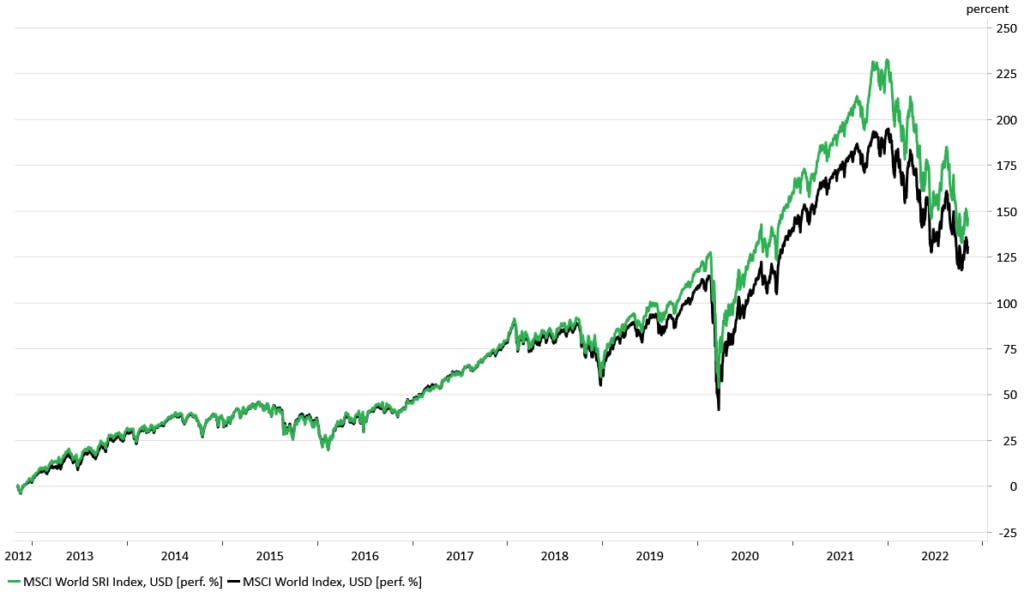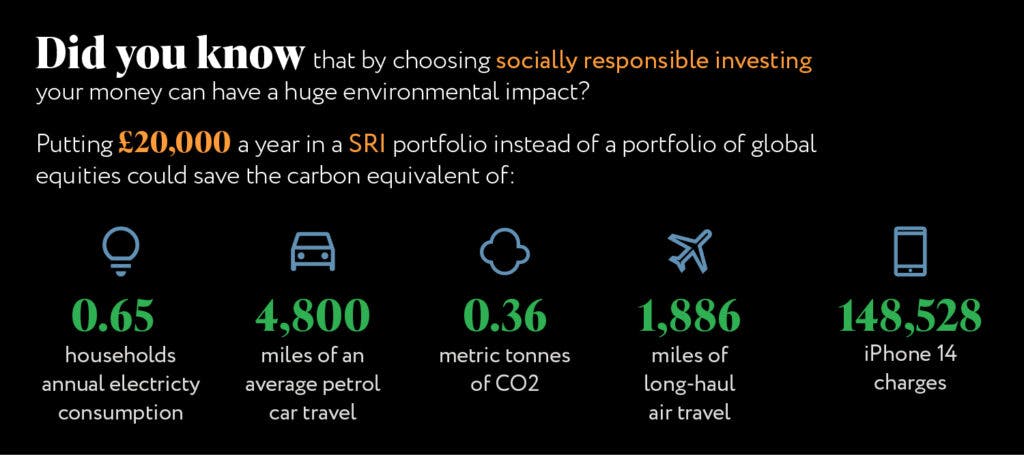
Momentum behind socially responsible investing (SRI) has grown tremendously in recent years, and as a trend rooted in long-term change it can be an ideal strategy to consider when investing for your retirement. So, what impact can a socially responsible pension really have?
While the core considerations in investing for your retirement remain universal – around risk, timescale, and the amount of money you’ll eventually need – a socially responsible pension can also address the question of what kind of world do you want to live in when you retire?
By choosing SRI as an investment style, you can give your money the best chance of making significant environmental and social changes around the globe, while still benefiting from investment returns. As your pension pot grows, so does the impact it has.
What is socially responsible investing (SRI)?
SRI is the practice of aligning your financial goals with your values and thinking about investment returns while also bringing about positive change on a wider scale. SRI is usually focused around three key areas: environmental, social and governance (ESG).
Environmental focuses on avoiding investment in areas such as pollution, deforestation, waste of resources, water stress and climate change. For social, the big areas of concern include working conditions, health and safety, community engagement, diversity, and combating child labour. For governance, investors should look for instances of bribery and corruption, while highlighting issues around executive pay, leadership diversity, data security, and tax strategy.
In the past decade, many of the world’s largest companies have started outlining their ESG credentials as a standard part of their annual reporting.
ESG legislation, aimed at both listed corporates and the funds that invest in them, is being introduced at pace to ensure corporates are open about any negative impact they may be having on society and the environment.
While ESG indices do contain those environmentally focused businesses that might first come to your mind when you think of SRI – such as those focused on renewable energy, electric cars, or waste management – there are also plenty of more traditional names that have been upfront and explicit about their targets.
For example, Microsoft with its ambitions to be carbon negative by 2030, while another tech name Nvidia has long been praised for its ethical standards in terms of governance and environmental performance.
These are the kinds of companies that put long-term sustainability at the heart of what they do, and therefore make for potentially ideal candidates for long-term investing, such as through a pension.
What kind of returns can I expect from an SRI pension?
In the long run, SRI has historically delivered better returns than mainstream traditional investing. As shown by the chart below, SRI portfolios have notably outperformed portfolios of global equities over the last ten years, though remember that past performance should not be taken as a guide to future returns.
The chart below shows the long-term performance of the MSCI World SRI Index versus the non-SRI MSCI World over the past decade.
Relative performance of global SRI stocks versus global stock market (10 years)

Source: Nutmeg, Macrobond
What kind of impact can my SRI pension have?
One environmental measure for SRI can impact the amount of carbon entering the atmosphere by investing in companies with sustainability goals, rather than polluting companies who do not have such concerns.
The infographic below shows the power of this carbon deficit based on putting £20,000 per year in an SRI portfolio. Imagine the impact you could have by investing into an SRI pension over 40 years.

Source: Nutmeg, MSCI
SRI as a long-term theme
No longer is SRI seen as a periphery consideration for those looking to do good or to take on extra risk. It is a legitimate approach that may, as we’ve seen in the graph above, bring market beating returns.
For us at Nutmeg, investing with a socially responsible focus means investing in companies that do business in a fair and progressive way: overweighting towards companies with strong sustainability profiles, while avoiding those that engage in controversial activities. We know that many of our clients share the same principles.
According to Bloomberg Intelligence, global ESG investments could grow from around 5trn in 2020 to surpass 0trn by 2025 – one third of total assets under management globally. However, for this to happen, there must be continued scrutiny of the companies and funds to make sure they are practicing what they preach, and not involved in ‘greenwashing’ – advertising and marketing spin to suggest they are more sustainable than they actually are.
What are some examples of socially responsible investing?
A typical SRI portfolio might invest in companies that, for example, are judged to have the highest welfare standards for their employees. It might also invest in companies that are involved in clean energy or safe environmental practices.
The portfolio may also choose to exclude certain businesses, such as those with significant exposure to the tobacco industry, or those involved in the production of weapons.
With increased demand for hard data and transparency around how companies operate – with more and more companies choosing to report on ESG metrics – we expect SRI to grow significantly in the years to come.
The most successful companies of the future will be those who use resources responsibly and who don’t fall foul of ESG violation regulations. Those companies benefitting now from SRI are in good stead to last well into the future, meaning that if they grow, your pension will be able to share in their success, compounding over time to reward your investment.
This is not a ‘fad’ but the long-term future of investing, and so the ideal investment style for those with a multi-decade horizon – particularly those investing in a pension.
Nutmeg’s approach to SRI
Nutmeg was among the first UK wealth managers to integrate ESG considerations in the management of all of our investment portfolios and to deliver ESG insights no matter how clients choose to invest.
Nutmeg has set out its ESG criteria to let our clients know how their portfolio scores against specific ESG metrics, empowering them to make informed and effective decisions. The criteria and research is undertaken with socially responsible research leader MSCI and is part of the pledge we made in signing the UN’s Principles of Responsible Investment.
In 2018, we launched our SRI portfolios for those that wish to put these principles at the heart of their investments. These managed portfolios, monitored daily by our investment team, lean towards companies and bond issuers that have high ESG standards. We invest in exchange traded funds (or ETFs) that avoid companies engaged in controversial activities, while focusing on those that lead their peers on ESG.
Is SRI worth it? Investing for the right kind of future
Even given its rapid emergence as a now mainstream concern. SRI remains a relatively young investment style. Change is ongoing as corporates, and society at large, put their principals to the fore.
As listed companies set new targets, data around topics such as carbon emissions and representation on company boards becomes more transparent, and newer, more efficient technologies gain traction, so the case for investing in this long-term change becomes clearer.
Whether you already invest in an SRI strategy through other products, or are contemplating your first investment, this is a theme that we believe should be under consideration for your pension as a long-term commitment to both your own future, as well as that of wider society and the environment.
Risk warning
As with all investing, your capital is at risk. The value of your portfolio with Nutmeg can go down as well as up and you may get back less than you invest. Past performance and forecasts are not reliable indicators of future performance. A pension may not be right for everyone and tax rules may change in the future. If you are unsure if a pension is right for you, please seek financial advice.


